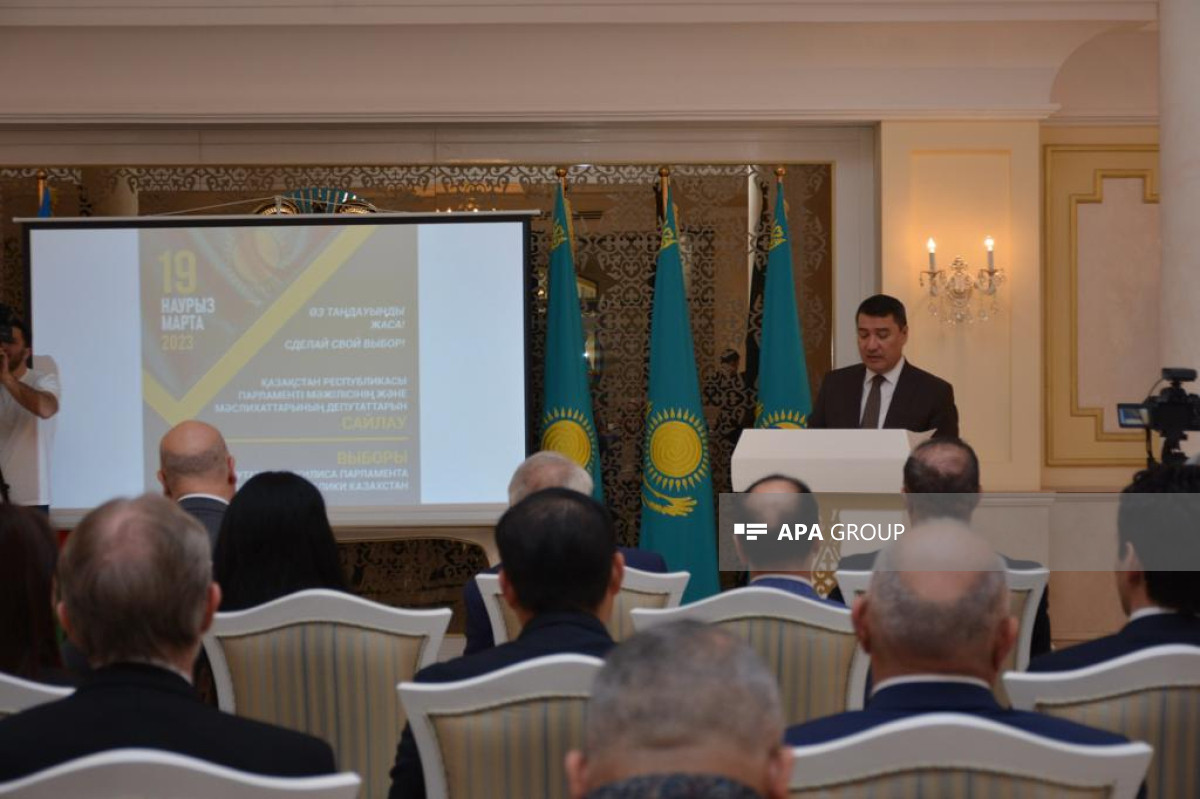For the first time, in his address to the people on September 1 last year, the President of Kazakhstan suggested holding early elections to the Majlis and Maslikhats.
APA informs that Serjan Abdikarimov, Ambassador Extraordinary and Plenipotentiary of Kazakhstan to our country, said this at a press conference today.
He noted that the President of Kazakhstan Kasim-Jomart Tokayev terminated the powers of the Majlis and Maslikhats when he announced the date of the lower house elections on January 19 this year.
Later, the Central Election Commission determined the time of the Maslikhat elections as March 19.
The diplomat added that thanks to the constitutional reforms carried out in Kazakhstan last year, the registration of political parties became much easier: "For example, the registration limit was reduced by 4 times from 20,000 participants to 5,000 people. The minimum requirement for the number of regional representatives of the parties was also reduced from 600 to 200 people.
"As a result of the reforms, a number of new and young parties have emerged in our country. In total, 7 parties have been registered in the country."
Abdikarimov emphasized that a total of 12,451 candidates were nominated, of which 716 are candidates for the Majlis and 11,735 candidates for the Maslikhat elections:
"To participate in the parliamentary elections, a candidate must be a citizen of Kazakhstan, at least 25 years old, and must have lived in Kazakhstan for the last ten years.
A candidate for elections to the Maslikhats must also be a citizen of Kazakhstan, live in the region he represents, and be at least 20 years old.
For the first time, a mixed proportional-majoritarian model will be used in the parliamentary elections, where 70 percent of deputies will be elected proportionally on party lists, and 30 percent will be elected on the principle of majority in single-mandate constituencies.
This initiative was put forward after the changes to the Constitution adopted as a result of the popular vote held on June 5, 2022.
Elections to councils of regional and republican cities will also be held on a 50/50 mixed electoral system.
These elections constitute the final stage of the cycle of political renewal, which started with the presidential elections held on November 20 last year and continued with the elections to the Senate (the upper house of the parliament) on January 14 this year.
Other important electoral rules include putting an "against all" column on all ballots, lowering the threshold for parties to enter the Assembly from 7 percent to 5 percent, and establishing a 30 percent quota for women, youth, and people with special needs in the legislation.
International observers from 10 international organizations were invited by the Ministry of Foreign Affairs of Kazakhstan to participate in the observation of extraordinary parliamentary elections in Kazakhstan.
These organizations include the OSCE Parliamentary Assembly, the Council of Europe Parliamentary Assembly, the CIS Executive Committee.
CIS Inter-Parliamentary Assembly, Shanghai Cooperation Organization, CSTO Parliamentary Assembly, Organization of Islamic Cooperation, Organization of Turkic States, Parliamentary Assembly of Turkic States take place.
The CEC of the Republic of Kazakhstan sent an invitation to the heads of the central election bodies of 34 foreign countries.
"Representatives of diplomatic corps accredited in Kazakhstan and international organizations were also invited to Kazakhstan to observe the elections."
